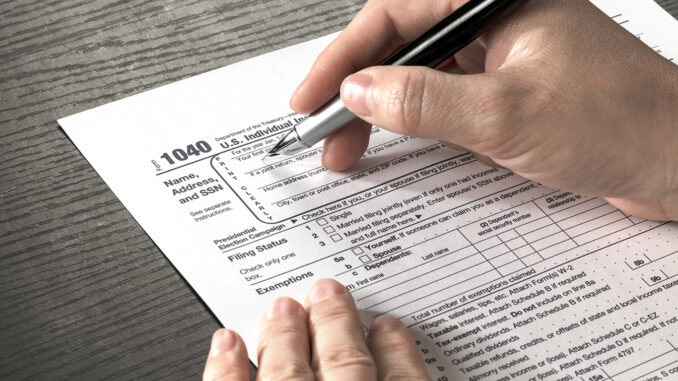
[ad_1]
Economy
In the absence of federal stimulus checks, several states came forward to help residents. These stimulus checks and many other rebates from states proved to be a lifeline for millions over the past two years. Now, the same stimulus checks and rebates could prove a nightmare for taxpayers this filing season. This is because the IRS has asked stimulus check receivers to hold off filing returns.
What Is IRS Saying About Filing 2022 Tax Return?
Last week, the IRS issued guidance asking taxpayers in several states to hold off filing their tax returns if they got stimulus checks and other special rebates from their states in 2022. The agency says that it is seeking clarification on whether those rebates are taxable income or not.
“We expect to provide additional clarity for as many states and taxpayers as possible next week,” the agency said, adding that the “rules surrounding them are complex” and that they need more time to determine the tax implications.
Until further guidance on the matter, the IRS recommends stimulus check receivers hold off filing returns, or “consult with a reputable tax professional.” To those who have already filed their 2022 return, the IRS recommends not to file an amendment.
The IRS’s latest advisory, and that just two weeks into tax filing, is making life difficult for taxpayers. Several taxpayers took to social media to express their frustration at the IRS’s latest guidance that asks stimulus check receivers to hold off filing returns.
“So I tried to sit down this morning for a fun game of Do Your Taxes, but turns out the IRS hasn’t decided if California’s Middle Class Tax Relief payments are taxable or not…,” one taxpayer tweeted.
As of now, it isn’t clear, in which states taxpayers need to hold off filing tax returns. According to the Urban-Brookings Tax Policy Center, at least 18 states came up with one-time refunds in 2022, including New Mexico, New York, California, Colorado, Connecticut, Maine, Massachusetts, Idaho, Illinois, Indiana, Delaware, Georgia, Hawaii, Oregon, Rhode Island, South Carolina, Arkansas, and Virginia.
Stimulus Check Receivers To Hold Off Filing Returns: Why?
Whether or not these special payments will affect federal taxes depends on federal law and the objective of these payments. It is known that COVID-19 related stimulus payments were not taxable.
However, it is possible payments and rebates related to inflation relief or tax surpluses could be subject to federal taxation. Moreover, the fact that each state has its rules for relief programs further adds to the confusion.
For example, California’s Middle Class Tax Refund won’t be taxed by the state. The state’s Franchise Tax Board, however, notes that this Middle Class Tax Refund, which covers the costs of rising inflation, could be taxed federally.
Similarly, New Mexico’s 2022 refundable income tax rebate won’t be taxed by the state, but the state’s Taxation and Revenue Department website says the “department cannot comment on any federal tax consequences of the rebates and relief payments.”
This article originally appeared on ValueWalk
Sponsored: Tips for Investing
A financial advisor can help you understand the advantages and disadvantages of investment properties. Finding a qualified financial advisor doesn’t have to be hard. SmartAsset’s free tool matches you with up to three financial advisors who serve your area, and you can interview your advisor matches at no cost to decide which one is right for you. If you’re ready to find an advisor who can help you achieve your financial goals, get started now.
Investing in real estate can diversify your portfolio. But expanding your horizons may add additional costs. If you’re an investor looking to minimize expenses, consider checking out online brokerages. They often offer low investment fees, helping you maximize your profit.

Leave a Reply